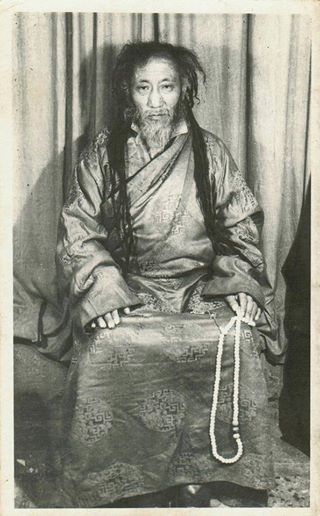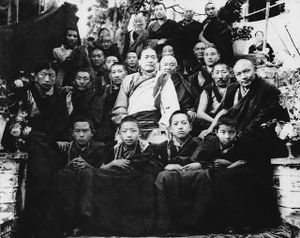Golok Serta Rinpoche: Difference between revisions
Yeshedorje (talk | contribs) mNo edit summary |
Yeshedorje (talk | contribs) mNo edit summary |
||
| Line 1: | Line 1: | ||
[[Image:Pema Lungtok Gyatso2.jpg|frame|Gokok Serta Rinpoche]] | [[Image:Pema Lungtok Gyatso2.jpg|frame|Gokok Serta Rinpoche]] | ||
'''Golok Serta Rinpoche''' (1891-1963 or 1964) (also known as '''Pema Lungtok Gyatso''' <ref>Information provided by Lama Chonam from a conversation he had with Getse Rinpoche on May 2004. According to Getse Rinpoche, " | '''Golok Serta Rinpoche''' (1891-1963 or 1964) (also known as '''Pema Lungtok Gyatso''' <ref>Information provided by Lama Chonam from a conversation he had with Getse Rinpoche on May 2004. According to Getse Rinpoche, "'''Golok Serta Rinpoche''' is not the same person as [[[Pema Lungtok Gyatso]]] who wrote the Chö commentary, even though he was also called Pema Lungtok Gyatso. The mahasiddha who wrote the Chö commentary was actually born in 1852, and we don't know when he died. He did study directly with Dudjom Lingpa."</ref>([[Wyl.]] ''pad+ma lung rtogs rgya mtsho'' was a great [[Chö]] practitioner of the [[Dudjom Tersar]] lineage. Born in 1891, he was 8 years old when he met [[Dudjom Lingpa]], and continued his training with [[Goser Onpo Khyenrab Gyasto Rinpoche]], one of his main students, and later with [[Degyal Rinpoche]]. He became one of the principal lineage holder of the [[Chö]] practice of the [[Dudjom Tersar]]. | ||
==Training== | ==Training== | ||
Revision as of 10:02, 19 May 2014

Golok Serta Rinpoche (1891-1963 or 1964) (also known as Pema Lungtok Gyatso [1](Wyl. pad+ma lung rtogs rgya mtsho was a great Chö practitioner of the Dudjom Tersar lineage. Born in 1891, he was 8 years old when he met Dudjom Lingpa, and continued his training with Goser Onpo Khyenrab Gyasto Rinpoche, one of his main students, and later with Degyal Rinpoche. He became one of the principal lineage holder of the Chö practice of the Dudjom Tersar.
Training
In 1923, he walked to Western Tibet and reached the base of Mount Kailash. He heard there for the first time of Degyal Rinpoche, a lama from Golok who had been a student of Dudjom Lingpa. He then went under training with Degyal Rinpoche.
In 1946, Golok Serta Rinpoche went for a pilgrimage to India, and traveled all across the Himalayan mountains. He used to teach Dharma during summer, while staying secluded in retreat during winter.His root master Degyal Rinpoche was reborn within his own family, as his son, and was name Second Degyal Rinpoche
In 1961, he went to India and met Dudjom Rinpoche in Kalimpong, who was then giving the transmission of the Nyingma Kama. It was on this occasion that Dudjom Rinpoche put him on a throne and introduced him to all participants, calling him 'Serta Drupchen', the great accomplished one from Serta.
Writings
Having attained the most excellent degree of scholarly learning and a lofty level of accomplishment, it seems he composed a great many works. Of these, today we may find only this presentation of the nine yanas, and a collection of practices related to Tara.
Family
Among his sons and daughters are:
- Machik Zangmo
- Second Degyal Rinpoche, the incarnation of his root master
- Shakya Dorjé
- Tsokhang Choktrul Tsewang Dorje
- Tendrel Zangmo
Disciples

Among his disciples are:
- Gourou Shri Zagat Prakash Lama.
- Lama Jampal Rabgyé
- Lama Katak Rigzin Dorjé
- Lama Pema Tashi
- Lama Thubten Phuntsok
- Lama Tongnyé
- Péma Kundröl Gyalpo
- Second Degyal Rinpoche, the incarnation of his root master
- Shakya Dorjé
- Tsokhang Choktrul Tsewang Dorje
- Tsultrim Gyatso Rinpoche
- Yonten Gyatso aka Khenpo Yönga
Incarnation
Golok Serta Rinpoche's tulku is his own grand-son, Shiva Rinpoche.
Notes
- ↑ Information provided by Lama Chonam from a conversation he had with Getse Rinpoche on May 2004. According to Getse Rinpoche, "Golok Serta Rinpoche is not the same person as [[[Pema Lungtok Gyatso]]] who wrote the Chö commentary, even though he was also called Pema Lungtok Gyatso. The mahasiddha who wrote the Chö commentary was actually born in 1852, and we don't know when he died. He did study directly with Dudjom Lingpa."